The business community in Germany and China has long been worrying about the German Supply Chain Act – particularly because it is so incredibly difficult to comply with the regulations in the People’s Republic. Without independent audits, it is almost impossible to reliably prove whether there is forced labor somewhere in the supply chain after all. A survey by the Hamburger Stiftung für Wirtschaftsethik available to Table.Media, shows that this does not necessarily equal a general rejection of regulating supply chains.
SMEs consider the protection of human rights in the supply chain to be absolutely necessary, as Caspar Dohmen analyzes. However, companies are less pleased with how the German law is being implemented. Not all of them feel properly represented by their associations either.
China is currently expanding its presence in an inhospitable spot on Earth. The People’s Republic is currently building its fifth and largest research station to date in Antarctica. Science is one thing. But China’s forays into Antarctica are also part of a “quest for superpower status“, writes Joern Petring. The US think tank CSIS has analyzed satellite images and a US military report. They suggest that Beijing’s stations in the Arctic could also be secret observation posts: Several of them have been fitted with conspicuous antennas, for example.

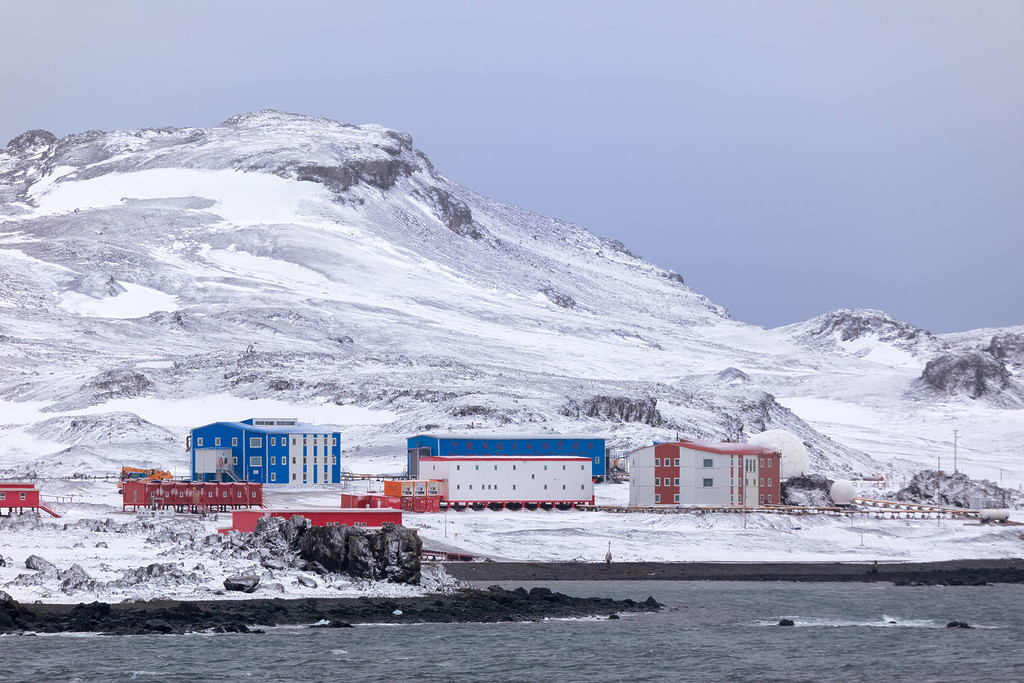
If a hole were drilled from Beijing to the other side of the planet, one would end up in the South Atlantic, between Argentina and Antarctica. So hardly any other place could be further away from China’s center of power than the Antarctic region.
Despite the enormous distance, China is harboring grand ambitions on the icy continent. A recent report by the Center for Strategic and International Studies (CSIS) shows how active they are in the region. After analyzing recent satellite images, the US think tank discovered that the construction of the new Taishang station on the Ross Sea, in particular, is progressing rapidly. It is China’s fifth research station on the South Pole.
“China is currently undertaking the most significant expansion of its footprint there in a decade,” the authors write. With an area of about 5,000 square meters, the new station is significantly larger than all previous bases of the People’s Republic. They argue that the growing presence of the People’s Republic in the remote polar regions also serves to “advance military and strategic goals.” China’s advances in Antarctica and the Arctic are part of its “broader pursuit of global great power status.”
According to international law, China, like many other nations, is allowed to maintain a presence in Antarctica. The legal basis for this is the Antarctic Treaty of 1959. This global agreement regulates political and economic activities on the continent and was initially signed by twelve nations, including the United States and the Soviet Union at the time. Today, more than 50 states joined; around 30 of them operate research stations.
The treaty stipulates that Antarctica may only be used for peaceful purposes. Military activities are prohibited. Nor may anyone lay claims over the Antarctic continent. Since then, the territorial claims of several states such as the United Kingdom, France, Argentina or Australia based on earlier acquisitions have been suspended.
Joining the treaty was anything but easy for China. In 1981, the treaty members rejected its first attempt to join – which Beijing perceived as a humiliation at the time. Then, in 1983, China signed the treaty. A short time later, construction of the Great Wall Station began, China’s first foothold in the region. Today, Beijing operates two stations on the coast and two inland.
The US may still maintain a larger research presence in Antarctica than China. But according to CSIS, China is currently more active in Antarctica than any other nation. Beijing is keen to be perceived as a strong Antarctic nation and hopes that its growing scientific presence will pave the way for having a greater say in the future administration of the region.
There are many disputes: For example, whether mineral mining should be allowed in the region or to what extent fishing should be allowed in the Arctic waters. Together with Russia, China has blocked the creation of new conservation areas in the region for years.
According to CSIS, however, China could have more than just showing off its geopolitical weight in Antarctica. The CSIS authors say that the equipment of the Chinese stations could also be used for espionage. They cite a US military report – and warn of “dual-use technologies” that “are likely intended, at least in part, to improve PLA capabilities.”
For instance, CSIS claims that the new Taishang station will be equipped with a satellite ground station that could be used for both scientific communication and espionage. The station’s location, which is currently under construction, is suited to collecting telemetry data from rockets launched from Australia or New Zealand, for example.
Chinese reports also indicate that China plans to expand its Zhongshan station with additional antennas. These antennas are to be built by the China Aerospace Science and Industry Corporation (CASIC). According to CSIS, China could use its position in Antarctica to gather information in the Indian Ocean to monitor Indian naval forces.
A yet unreleased survey by the Hamburger Stiftung für Wirtschaftsethik (Hamburg Foundation for Business Ethics) available to Table.Media offers a rare detailed insight into the perception of the Supply Chain Act by Germany’s small and medium-sized enterprises (SMEs). The confidentially surveyed companies consider human rights protection in value creation networks to be “necessary” in principle. And they “predominantly believe that a legal framework or binding strategy is necessary,” write the study authors Christiane Hellar, Jesco Kreft and Miriam Putz.
In particular, supply chains in China have recently been in the public eye. German carmakers, in particular, face pressure due to the high risk of forced labor among their suppliers. However, as foreign companies cannot enforce the necessary independent audits against the will of local authorities, much uncertainty persists. Other sectors are also affected: agriculture, solar, and mining.
Because German consumers have become far more aware of the problem, “there is a high acceptance of the German Supply Chain Act” (LkSG) among companies.
For years, two positions from the business community have dominated the public discourse on supply chain regulation in Germany: On the one side, there are clear supporters of supply chain laws. These include companies such as mountain sports equipment producer Vaude and coffee chain retailer Tchibo as well as mostly smaller progressive business associations such as the German Sustainable Business Association or B.A.U.M. And on the other side are large associations that have long opposed national supply chain regulation on human rights and now want to prevent the EU from also adopting regulations that go too far in their eyes. Important voices here are the Federation of German Industries, Confederation of German Employers’ Associations and Mechanical Engineering Industry Association.
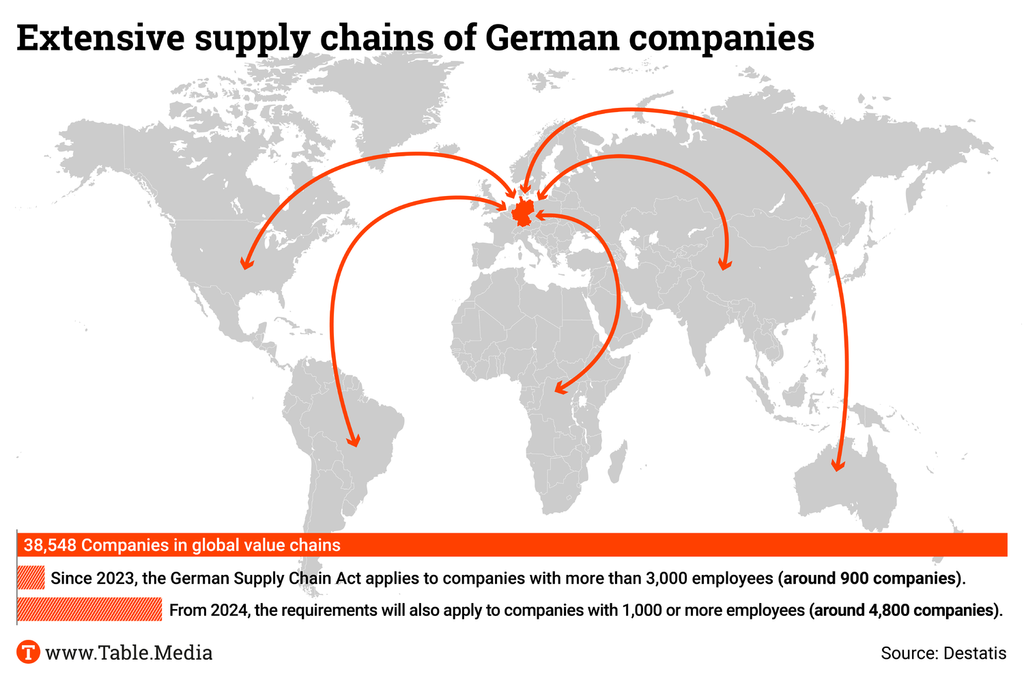
Critics refer to competence problems, bureaucracy, costs and practicability. Recently, the German Family Business Foundation warned against “inflationary” regulation. Currently, companies have to implement 20 new laws and directives with auditing, reporting and disclosure requirements. Twelve projects come from Europe, and eight are from Germany. “We cannot master the ecological transformation with reporting obligations and regulation, but above all with entrepreneurial initiative and innovation,” said Professor Rainer Kirchdoerfer, Chairman of the Foundation for Family Businesses and Politics.
The survey by the Hamburger Stiftung für Unternehmensethik conveys a third, different position of companies: SMEs that are irritated by the criticism of supply chain legislation voiced by their own associations – or companies that consider supply chain regulation to be generally right, but are displeased with its implementation.
Many SMEs are already working on the subject, although they are not directly affected by the law, as the obligation so far only applies to companies with more than 3,000 employees. But large companies are passing on the requirements to their customers – primarily SMEs – which, the analysis shows, “leads to a broadening of human rights due diligence obligations far beyond the scope of the law.”
The companies surveyed speak of financial burdens caused by supply chain regulation. However, the report says these cannot be accurately quantified as the implementation of human rights due diligence obligations is predominantly a cross-sectional task.
Companies considered using additional resources to be a “reasonable entrepreneurial investment.” Some companies see a “representation problem” on the part of their associations. “Their political interest groups first ignored the fundamentally positive position of many SMEs, then spent too long trying to prevent it, and finally were not sufficiently pragmatic in their involvement in the concrete design,” it is said. They consider doubts that SMEs cannot operationally and conceptually implement the requirements of the law to be inappropriate. This political narrative was even dismissed by “companies that were originally skeptical of the law as being unrelated to the economy or the SME sector,” according to the study.
However, companies see the danger that “in the medium term, a compliance perspective could dominate the law’s implementation.” Companies could focus on becoming legally untouchable, while the real improvement of conditions along the supply chains would be neglected. As a result, there would be little benefit to the matter at hand – i.e., improving the situation for people and the environment along supply chains.
SMEs expect “considerable enforcement problems” in China, where the requirements from the Supply Chain Act and their means of exerting influence on the ground confront them with “paradoxical obligations,” which could fundamentally question a whole range of business models with a significant link to China in the supply chain. Company representatives say it is impossible to guarantee compliance with human rights “in an authoritarian, non-democratic country.” Upon further inquiry, about a quarter of respondents stated they would consider a complete withdrawal from certain Chinese regions in the medium term.
When implementing human rights due diligence, companies usually used instruments and procedures with which they already have experience in the area of environmental protection.
SMEs are not satisfied with the implementation of the law by the German Office for Economic Affairs and Export Control (BAFA). Until well into the late summer of 2022, the agency did not provide any assistance in interpreting important points. Furthermore, companies wish for more concrete help from the authority’s helpdesk regarding procedures, instruments, reports and assessments of the scope and depth of the law. The companies also express dissatisfaction with the corresponding advisory services offered by German chambers of commerce.
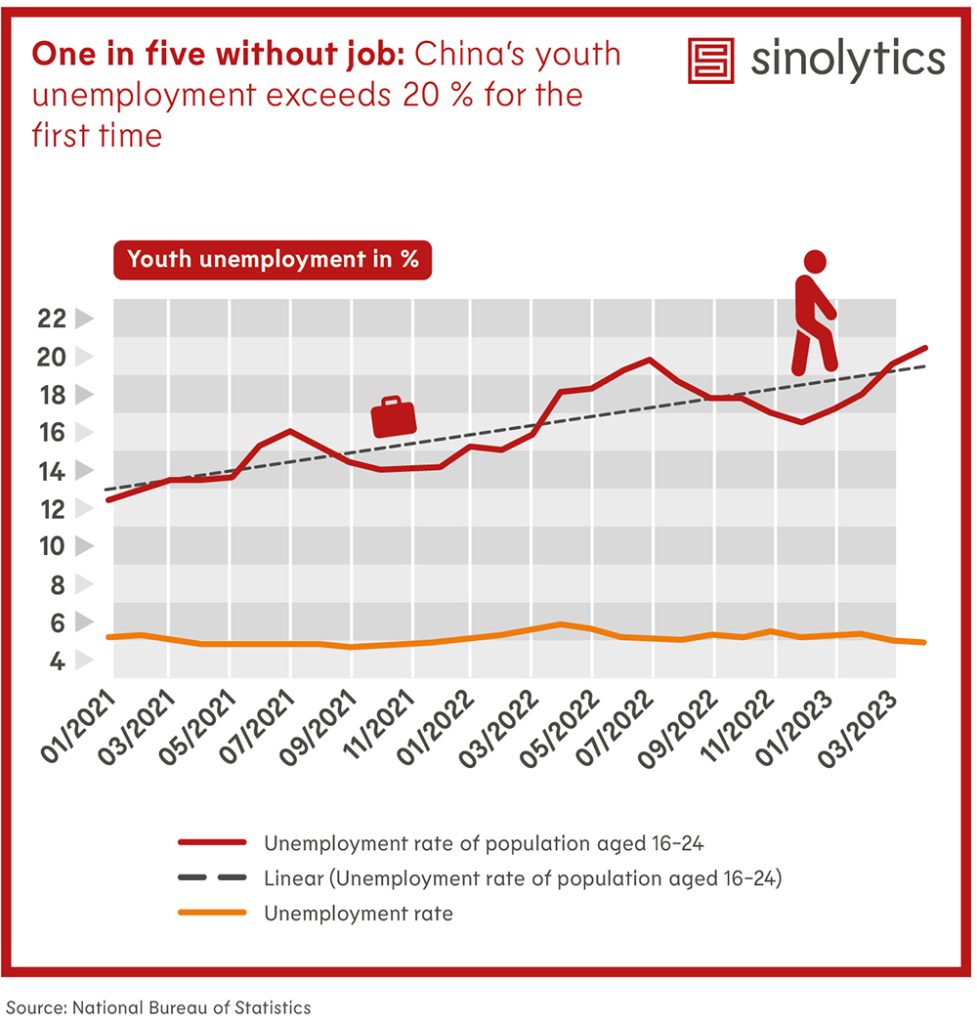
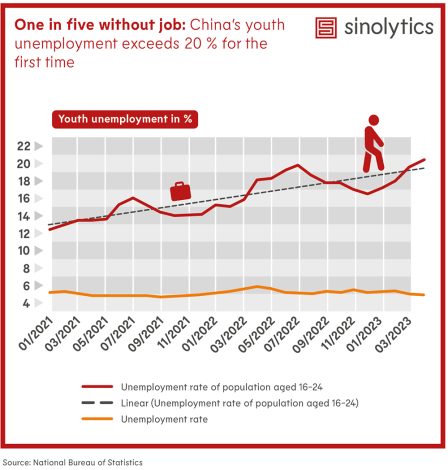
Sinolytics is a European research-based consultancy entirely focused on China. It advises European companies on their strategic orientation and concrete business activities in the People’s Republic.
Russia’s new Prime Minister, Mikhail Mishustin, has traveled to China for a two-day inaugural visit. Mishustin is accompanied by Deputy Prime Minister Alexander Novak, who is responsible for energy. The visit will focus on expanding economic relations.
Among other things, Mishustin attended a Sino-Russian business forum in Shanghai on Tuesday, to which sanctioned Russian tycoons from the key sectors of fertilizer, steel and mining were invited, according to Bloomberg. At other stops on the visit, he spoke with Russian company representatives and visited a petrochemical research institute run by state-owned Sinopec. A meeting with the new Brazilian chair of the BRICS bank, Dilma Rousseff, was also planned.
In Shanghai, Mishustin stressed that trade with China had helped Russia reduce its “dependence on the dollar.” He emphasized that Russia’s farmers were ready to increase agricultural exports to China significantly. During the pandemic, China had severely restricted agricultural imports, including from Russia. Logistical problems are also currently hampering wheat imports from Russia, among others. Conversely, China’s exports to Russia increased by 153 percent year-on-year in April to 9.6 billion US dollars, a new record.
Mishustin is expected to meet his counterpart Li Qiang and President Xi Jinping in Beijing on Wednesday. According to the Russian government, the talks will focus on energy, transport infrastructure and agricultural cooperation.
The visit again illustrates that China is committed to business as usual with Russia despite the Ukraine war and that the two states are openly defying Western sanctions. The EU, US, UK, Australia and Canada have all imposed sanctions on Mishustin. ck
British Prime Minister Rishi Sunak has warned G7 countries against descending into “blanket” protectionism against China. The UK is taking a more “targeted and specific” approach in those areas where China poses the greatest threat to its economic security, Sunak said Tuesday at the London Defence Conference. There are a “limited number of very sensitive sectors,” such as semiconductors, where the government will take a “particularly robust” approach, he said. “But this is not an excuse for a blanket descent into protectionism.”
Sunak apparently wants to calm tensions. At last week’s G7 summit in Hiroshima, Japan, he had called China the greatest challenge to world security and prosperity. Beijing reacted with outrage. At the summit, G7 leaders had discussed how to jointly engage with China. They agreed to seek “constructive and stable” relations while advancing steps to reduce dependence on Beijing in key supply chains. cyb
A new Covid wave is apparently sweeping China. According to models by government advisor Zhong Nanshan, the latest outbreak is thought to have been caused by the Omicron XBB subvariant and began as early as mid-April. By the end of May, the wave is expected to lead to 40 million infections per week, peaking at 65 million weekly infections by the end of June.
Zhong drew attention to the fact that two Covid vaccines explicitly developed for the Omicron XBB subvariant have been approved in China, and two other domestic XBB vaccines are close to approval. It is China’s second Covid wave since Beijing dropped its zero-Covid policy at the end of 2022. cyb
Fast fashion giant Shein is also expanding rapidly in Latin America. Several weeks ago, Shein announced plans to invest 148 million US dollars in Latin America, and 100 factories in Brazil are already producing for the online retailer.
It is part of a larger plan to expand production outside China and take advantage of rapid growth in Latin America, Shein shareholder and Latin America chief Marcelo Claure told Bloomberg News in an interview. Shein currently manufactures almost all of its products in China, but sells virtually nothing to Chinese customers. The company wants to locate production in growth regions to reduce distribution costs and shorten delivery times. In April, Shein announced plans to partner with 2,000 Brazilian textile mills over the next five years. It announced similar plans for India and Turkey.
“Latin America plays an important part of Shein’s revenue. It’s definitely one of the fastest-growing regions in the world,” said billionaire Claure, who has invested 100 million US dollars in the company. He pointed out that Shein is one of the most downloaded apps in Brazil. cyb
A Patek Philippe watch worn by the last emperor of the Qing Dynasty sold for 48.85 million Hong Kong dollars (about 5.8 million euros) at a live auction in Hong Kong on Tuesday. The auction lasted only about seven minutes.
Aisin-Gioro Puyi, the last emperor of the Qing dynasty, had gifted the watch to his interpreter Georgy Permyakov. Permyakov had accompanied Puyi during his imprisonment in the Soviet Union between 1945 and 1950. Puyi, who was crowned emperor in 1908 at the age of under three, was driven from the throne in 1912 during the Chinese Revolution, which sealed the end of the last imperial dynasty. However, he was allowed to keep his title and initially also the wealth of his dynasty. But in 1924, he had to leave the imperial palace for good and, from then on, had financial difficulties. It is unknown when or how Puyi came into possession of the watch, which was completed in 1937.
A red paper fan that Puyi had personally inscribed and given to his interpreter in Tokyo was also successfully auctioned – for the equivalent of around 72,000 euros. cyb
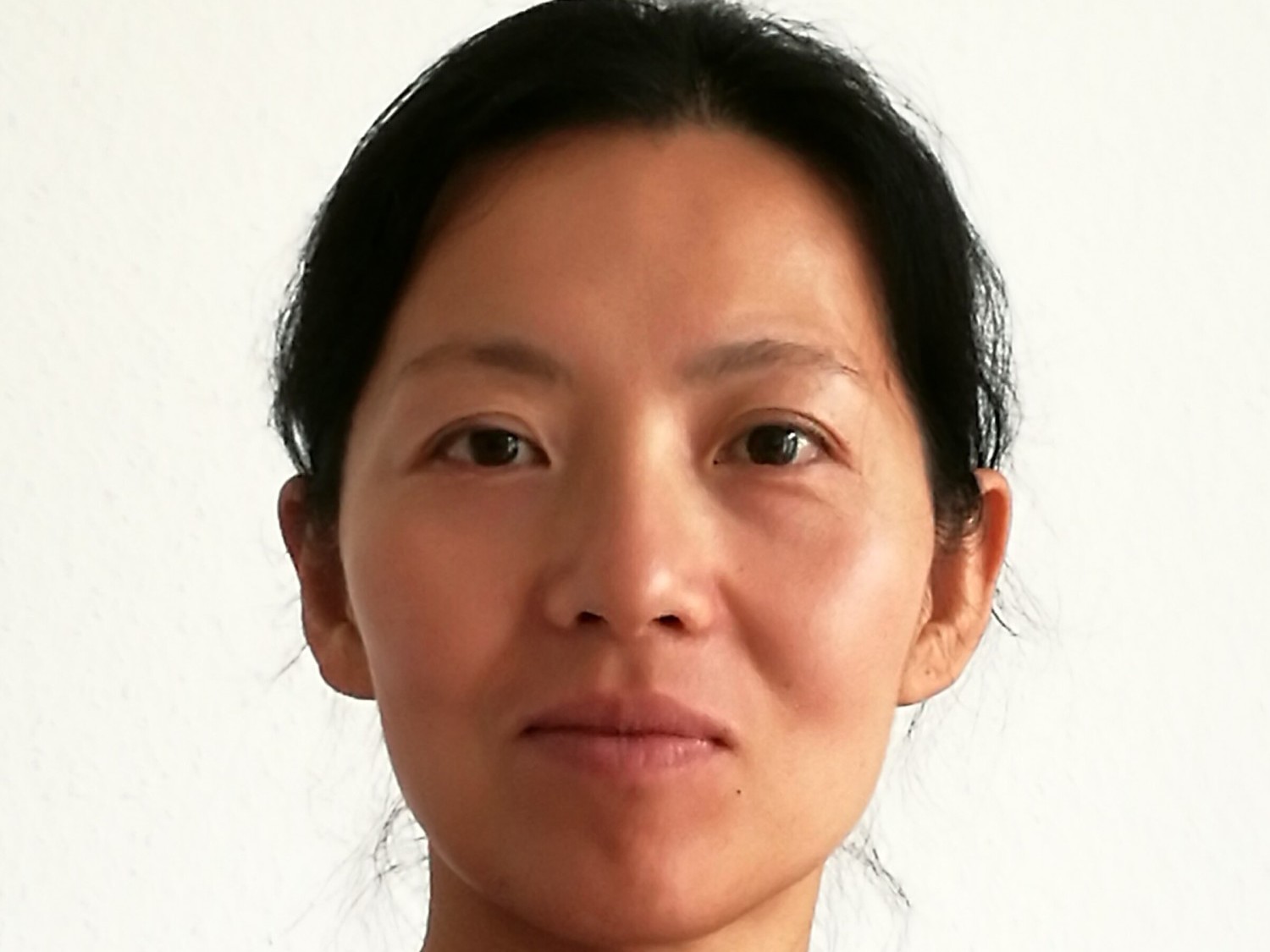
When Lihong Koblin was young, her father got up every morning before the first sunlight and met his students in the courtyard of the family home. As a traditional Wu Shu master, he had dedicated his life entirely to practicing and teaching the martial art. “His inner attitude and demeanor made a big impression on me at the time,” recalls Koblin, a Taiji master and founder of a Taiji institute in Freiburg, Germany. “Sometimes he was called to Wu Shu competitions, where it was not uncommon for young men to get into violent group fights.”
With a few quick moves, her father separated the fighting parties. He then said a few words and left. “I have his voice in my ear to this day: The art of fighting is to stop the fight.”
Koblin studied in Shandong and Sichuan provinces and came to Berlin in 1999 as an exchange student, where she met her husband. After graduation, she worked in finance around the world, but felt a growing urge to reconnect with her roots. She spent years reflecting on her origins and Chinese culture, eventually traveling repeatedly to the place of Taiji’s origin, the Daoist Wudang Mountains in central China. “I realized that I shouldn’t keep this knowledge and practice, which has been maturing inside me since the early years of my life, to myself,” Koblin says. “That it was even my duty to pass it on to society.”
Koblin moved with her family to Freiburg almost 20 years ago and founded a taiji institute, which she still runs to this day. There, she teaches Taiji and Qigong. “Having long since outgrown my parental home, I am in a sense reviving my childhood,” she says. Seeing the change and healing that Taiji and Qigong bring about in the lives of her students fills her with deep joy.
Koblin’s own return to the art of movement and her family’s tradition helped her find her way in foreign countries and eventually in Germany. “To this day, I am usually the only Chinese or Asian in my professional and personal life,” she says. She says that intercultural communication and the search for cultural identity are ever-present themes for her.
By practicing and passing on traditional Chinese movement forms, Koblin found a way to make cultural differences, but also similarities, visible, to make them tangible, and to empower herself and her students to make their own decisions. Her work is thus always also a process of opening up and self-empowerment.
When asked about her future goals, Koblin is modest: “I don’t have any goals that I necessarily want to strive for,” she says. But she does pursue the ambition that every lesson she gives differs from the one before – “and that I’m inspired every day.” Svenja Napp
Antonio Scali has been Realization Project Lead Logistics MINI Electric/ Spotlight for BMW China since March. The focus of his work is Spotlight Automotive Ltd, the joint venture between Great Wall Motors and BMW AG in Zhangjiagang.
Franz Schneller has been General Manager of FS-Engineering & Consulting in Shenyang since March. Until May, he was employed as Operations Manager of Shuangma Industry Engineering & Consulting.
Is something changing in your organization? Let us know at heads@table.media!

Winter wheat harvest in the village of Gujiabang in the eastern Chinese province of Jiangsu: Combine harvesters bring in the ripe grain. According to official figures, the winter wheat harvest is even ahead of schedule this year.
The business community in Germany and China has long been worrying about the German Supply Chain Act – particularly because it is so incredibly difficult to comply with the regulations in the People’s Republic. Without independent audits, it is almost impossible to reliably prove whether there is forced labor somewhere in the supply chain after all. A survey by the Hamburger Stiftung für Wirtschaftsethik available to Table.Media, shows that this does not necessarily equal a general rejection of regulating supply chains.
SMEs consider the protection of human rights in the supply chain to be absolutely necessary, as Caspar Dohmen analyzes. However, companies are less pleased with how the German law is being implemented. Not all of them feel properly represented by their associations either.
China is currently expanding its presence in an inhospitable spot on Earth. The People’s Republic is currently building its fifth and largest research station to date in Antarctica. Science is one thing. But China’s forays into Antarctica are also part of a “quest for superpower status“, writes Joern Petring. The US think tank CSIS has analyzed satellite images and a US military report. They suggest that Beijing’s stations in the Arctic could also be secret observation posts: Several of them have been fitted with conspicuous antennas, for example.


If a hole were drilled from Beijing to the other side of the planet, one would end up in the South Atlantic, between Argentina and Antarctica. So hardly any other place could be further away from China’s center of power than the Antarctic region.
Despite the enormous distance, China is harboring grand ambitions on the icy continent. A recent report by the Center for Strategic and International Studies (CSIS) shows how active they are in the region. After analyzing recent satellite images, the US think tank discovered that the construction of the new Taishang station on the Ross Sea, in particular, is progressing rapidly. It is China’s fifth research station on the South Pole.
“China is currently undertaking the most significant expansion of its footprint there in a decade,” the authors write. With an area of about 5,000 square meters, the new station is significantly larger than all previous bases of the People’s Republic. They argue that the growing presence of the People’s Republic in the remote polar regions also serves to “advance military and strategic goals.” China’s advances in Antarctica and the Arctic are part of its “broader pursuit of global great power status.”
According to international law, China, like many other nations, is allowed to maintain a presence in Antarctica. The legal basis for this is the Antarctic Treaty of 1959. This global agreement regulates political and economic activities on the continent and was initially signed by twelve nations, including the United States and the Soviet Union at the time. Today, more than 50 states joined; around 30 of them operate research stations.
The treaty stipulates that Antarctica may only be used for peaceful purposes. Military activities are prohibited. Nor may anyone lay claims over the Antarctic continent. Since then, the territorial claims of several states such as the United Kingdom, France, Argentina or Australia based on earlier acquisitions have been suspended.
Joining the treaty was anything but easy for China. In 1981, the treaty members rejected its first attempt to join – which Beijing perceived as a humiliation at the time. Then, in 1983, China signed the treaty. A short time later, construction of the Great Wall Station began, China’s first foothold in the region. Today, Beijing operates two stations on the coast and two inland.
The US may still maintain a larger research presence in Antarctica than China. But according to CSIS, China is currently more active in Antarctica than any other nation. Beijing is keen to be perceived as a strong Antarctic nation and hopes that its growing scientific presence will pave the way for having a greater say in the future administration of the region.
There are many disputes: For example, whether mineral mining should be allowed in the region or to what extent fishing should be allowed in the Arctic waters. Together with Russia, China has blocked the creation of new conservation areas in the region for years.
According to CSIS, however, China could have more than just showing off its geopolitical weight in Antarctica. The CSIS authors say that the equipment of the Chinese stations could also be used for espionage. They cite a US military report – and warn of “dual-use technologies” that “are likely intended, at least in part, to improve PLA capabilities.”
For instance, CSIS claims that the new Taishang station will be equipped with a satellite ground station that could be used for both scientific communication and espionage. The station’s location, which is currently under construction, is suited to collecting telemetry data from rockets launched from Australia or New Zealand, for example.
Chinese reports also indicate that China plans to expand its Zhongshan station with additional antennas. These antennas are to be built by the China Aerospace Science and Industry Corporation (CASIC). According to CSIS, China could use its position in Antarctica to gather information in the Indian Ocean to monitor Indian naval forces.
A yet unreleased survey by the Hamburger Stiftung für Wirtschaftsethik (Hamburg Foundation for Business Ethics) available to Table.Media offers a rare detailed insight into the perception of the Supply Chain Act by Germany’s small and medium-sized enterprises (SMEs). The confidentially surveyed companies consider human rights protection in value creation networks to be “necessary” in principle. And they “predominantly believe that a legal framework or binding strategy is necessary,” write the study authors Christiane Hellar, Jesco Kreft and Miriam Putz.
In particular, supply chains in China have recently been in the public eye. German carmakers, in particular, face pressure due to the high risk of forced labor among their suppliers. However, as foreign companies cannot enforce the necessary independent audits against the will of local authorities, much uncertainty persists. Other sectors are also affected: agriculture, solar, and mining.
Because German consumers have become far more aware of the problem, “there is a high acceptance of the German Supply Chain Act” (LkSG) among companies.
For years, two positions from the business community have dominated the public discourse on supply chain regulation in Germany: On the one side, there are clear supporters of supply chain laws. These include companies such as mountain sports equipment producer Vaude and coffee chain retailer Tchibo as well as mostly smaller progressive business associations such as the German Sustainable Business Association or B.A.U.M. And on the other side are large associations that have long opposed national supply chain regulation on human rights and now want to prevent the EU from also adopting regulations that go too far in their eyes. Important voices here are the Federation of German Industries, Confederation of German Employers’ Associations and Mechanical Engineering Industry Association.

Critics refer to competence problems, bureaucracy, costs and practicability. Recently, the German Family Business Foundation warned against “inflationary” regulation. Currently, companies have to implement 20 new laws and directives with auditing, reporting and disclosure requirements. Twelve projects come from Europe, and eight are from Germany. “We cannot master the ecological transformation with reporting obligations and regulation, but above all with entrepreneurial initiative and innovation,” said Professor Rainer Kirchdoerfer, Chairman of the Foundation for Family Businesses and Politics.
The survey by the Hamburger Stiftung für Unternehmensethik conveys a third, different position of companies: SMEs that are irritated by the criticism of supply chain legislation voiced by their own associations – or companies that consider supply chain regulation to be generally right, but are displeased with its implementation.
Many SMEs are already working on the subject, although they are not directly affected by the law, as the obligation so far only applies to companies with more than 3,000 employees. But large companies are passing on the requirements to their customers – primarily SMEs – which, the analysis shows, “leads to a broadening of human rights due diligence obligations far beyond the scope of the law.”
The companies surveyed speak of financial burdens caused by supply chain regulation. However, the report says these cannot be accurately quantified as the implementation of human rights due diligence obligations is predominantly a cross-sectional task.
Companies considered using additional resources to be a “reasonable entrepreneurial investment.” Some companies see a “representation problem” on the part of their associations. “Their political interest groups first ignored the fundamentally positive position of many SMEs, then spent too long trying to prevent it, and finally were not sufficiently pragmatic in their involvement in the concrete design,” it is said. They consider doubts that SMEs cannot operationally and conceptually implement the requirements of the law to be inappropriate. This political narrative was even dismissed by “companies that were originally skeptical of the law as being unrelated to the economy or the SME sector,” according to the study.
However, companies see the danger that “in the medium term, a compliance perspective could dominate the law’s implementation.” Companies could focus on becoming legally untouchable, while the real improvement of conditions along the supply chains would be neglected. As a result, there would be little benefit to the matter at hand – i.e., improving the situation for people and the environment along supply chains.
SMEs expect “considerable enforcement problems” in China, where the requirements from the Supply Chain Act and their means of exerting influence on the ground confront them with “paradoxical obligations,” which could fundamentally question a whole range of business models with a significant link to China in the supply chain. Company representatives say it is impossible to guarantee compliance with human rights “in an authoritarian, non-democratic country.” Upon further inquiry, about a quarter of respondents stated they would consider a complete withdrawal from certain Chinese regions in the medium term.
When implementing human rights due diligence, companies usually used instruments and procedures with which they already have experience in the area of environmental protection.
SMEs are not satisfied with the implementation of the law by the German Office for Economic Affairs and Export Control (BAFA). Until well into the late summer of 2022, the agency did not provide any assistance in interpreting important points. Furthermore, companies wish for more concrete help from the authority’s helpdesk regarding procedures, instruments, reports and assessments of the scope and depth of the law. The companies also express dissatisfaction with the corresponding advisory services offered by German chambers of commerce.


Sinolytics is a European research-based consultancy entirely focused on China. It advises European companies on their strategic orientation and concrete business activities in the People’s Republic.
Russia’s new Prime Minister, Mikhail Mishustin, has traveled to China for a two-day inaugural visit. Mishustin is accompanied by Deputy Prime Minister Alexander Novak, who is responsible for energy. The visit will focus on expanding economic relations.
Among other things, Mishustin attended a Sino-Russian business forum in Shanghai on Tuesday, to which sanctioned Russian tycoons from the key sectors of fertilizer, steel and mining were invited, according to Bloomberg. At other stops on the visit, he spoke with Russian company representatives and visited a petrochemical research institute run by state-owned Sinopec. A meeting with the new Brazilian chair of the BRICS bank, Dilma Rousseff, was also planned.
In Shanghai, Mishustin stressed that trade with China had helped Russia reduce its “dependence on the dollar.” He emphasized that Russia’s farmers were ready to increase agricultural exports to China significantly. During the pandemic, China had severely restricted agricultural imports, including from Russia. Logistical problems are also currently hampering wheat imports from Russia, among others. Conversely, China’s exports to Russia increased by 153 percent year-on-year in April to 9.6 billion US dollars, a new record.
Mishustin is expected to meet his counterpart Li Qiang and President Xi Jinping in Beijing on Wednesday. According to the Russian government, the talks will focus on energy, transport infrastructure and agricultural cooperation.
The visit again illustrates that China is committed to business as usual with Russia despite the Ukraine war and that the two states are openly defying Western sanctions. The EU, US, UK, Australia and Canada have all imposed sanctions on Mishustin. ck
British Prime Minister Rishi Sunak has warned G7 countries against descending into “blanket” protectionism against China. The UK is taking a more “targeted and specific” approach in those areas where China poses the greatest threat to its economic security, Sunak said Tuesday at the London Defence Conference. There are a “limited number of very sensitive sectors,” such as semiconductors, where the government will take a “particularly robust” approach, he said. “But this is not an excuse for a blanket descent into protectionism.”
Sunak apparently wants to calm tensions. At last week’s G7 summit in Hiroshima, Japan, he had called China the greatest challenge to world security and prosperity. Beijing reacted with outrage. At the summit, G7 leaders had discussed how to jointly engage with China. They agreed to seek “constructive and stable” relations while advancing steps to reduce dependence on Beijing in key supply chains. cyb
A new Covid wave is apparently sweeping China. According to models by government advisor Zhong Nanshan, the latest outbreak is thought to have been caused by the Omicron XBB subvariant and began as early as mid-April. By the end of May, the wave is expected to lead to 40 million infections per week, peaking at 65 million weekly infections by the end of June.
Zhong drew attention to the fact that two Covid vaccines explicitly developed for the Omicron XBB subvariant have been approved in China, and two other domestic XBB vaccines are close to approval. It is China’s second Covid wave since Beijing dropped its zero-Covid policy at the end of 2022. cyb
Fast fashion giant Shein is also expanding rapidly in Latin America. Several weeks ago, Shein announced plans to invest 148 million US dollars in Latin America, and 100 factories in Brazil are already producing for the online retailer.
It is part of a larger plan to expand production outside China and take advantage of rapid growth in Latin America, Shein shareholder and Latin America chief Marcelo Claure told Bloomberg News in an interview. Shein currently manufactures almost all of its products in China, but sells virtually nothing to Chinese customers. The company wants to locate production in growth regions to reduce distribution costs and shorten delivery times. In April, Shein announced plans to partner with 2,000 Brazilian textile mills over the next five years. It announced similar plans for India and Turkey.
“Latin America plays an important part of Shein’s revenue. It’s definitely one of the fastest-growing regions in the world,” said billionaire Claure, who has invested 100 million US dollars in the company. He pointed out that Shein is one of the most downloaded apps in Brazil. cyb
A Patek Philippe watch worn by the last emperor of the Qing Dynasty sold for 48.85 million Hong Kong dollars (about 5.8 million euros) at a live auction in Hong Kong on Tuesday. The auction lasted only about seven minutes.
Aisin-Gioro Puyi, the last emperor of the Qing dynasty, had gifted the watch to his interpreter Georgy Permyakov. Permyakov had accompanied Puyi during his imprisonment in the Soviet Union between 1945 and 1950. Puyi, who was crowned emperor in 1908 at the age of under three, was driven from the throne in 1912 during the Chinese Revolution, which sealed the end of the last imperial dynasty. However, he was allowed to keep his title and initially also the wealth of his dynasty. But in 1924, he had to leave the imperial palace for good and, from then on, had financial difficulties. It is unknown when or how Puyi came into possession of the watch, which was completed in 1937.
A red paper fan that Puyi had personally inscribed and given to his interpreter in Tokyo was also successfully auctioned – for the equivalent of around 72,000 euros. cyb

When Lihong Koblin was young, her father got up every morning before the first sunlight and met his students in the courtyard of the family home. As a traditional Wu Shu master, he had dedicated his life entirely to practicing and teaching the martial art. “His inner attitude and demeanor made a big impression on me at the time,” recalls Koblin, a Taiji master and founder of a Taiji institute in Freiburg, Germany. “Sometimes he was called to Wu Shu competitions, where it was not uncommon for young men to get into violent group fights.”
With a few quick moves, her father separated the fighting parties. He then said a few words and left. “I have his voice in my ear to this day: The art of fighting is to stop the fight.”
Koblin studied in Shandong and Sichuan provinces and came to Berlin in 1999 as an exchange student, where she met her husband. After graduation, she worked in finance around the world, but felt a growing urge to reconnect with her roots. She spent years reflecting on her origins and Chinese culture, eventually traveling repeatedly to the place of Taiji’s origin, the Daoist Wudang Mountains in central China. “I realized that I shouldn’t keep this knowledge and practice, which has been maturing inside me since the early years of my life, to myself,” Koblin says. “That it was even my duty to pass it on to society.”
Koblin moved with her family to Freiburg almost 20 years ago and founded a taiji institute, which she still runs to this day. There, she teaches Taiji and Qigong. “Having long since outgrown my parental home, I am in a sense reviving my childhood,” she says. Seeing the change and healing that Taiji and Qigong bring about in the lives of her students fills her with deep joy.
Koblin’s own return to the art of movement and her family’s tradition helped her find her way in foreign countries and eventually in Germany. “To this day, I am usually the only Chinese or Asian in my professional and personal life,” she says. She says that intercultural communication and the search for cultural identity are ever-present themes for her.
By practicing and passing on traditional Chinese movement forms, Koblin found a way to make cultural differences, but also similarities, visible, to make them tangible, and to empower herself and her students to make their own decisions. Her work is thus always also a process of opening up and self-empowerment.
When asked about her future goals, Koblin is modest: “I don’t have any goals that I necessarily want to strive for,” she says. But she does pursue the ambition that every lesson she gives differs from the one before – “and that I’m inspired every day.” Svenja Napp
Antonio Scali has been Realization Project Lead Logistics MINI Electric/ Spotlight for BMW China since March. The focus of his work is Spotlight Automotive Ltd, the joint venture between Great Wall Motors and BMW AG in Zhangjiagang.
Franz Schneller has been General Manager of FS-Engineering & Consulting in Shenyang since March. Until May, he was employed as Operations Manager of Shuangma Industry Engineering & Consulting.
Is something changing in your organization? Let us know at heads@table.media!

Winter wheat harvest in the village of Gujiabang in the eastern Chinese province of Jiangsu: Combine harvesters bring in the ripe grain. According to official figures, the winter wheat harvest is even ahead of schedule this year.
